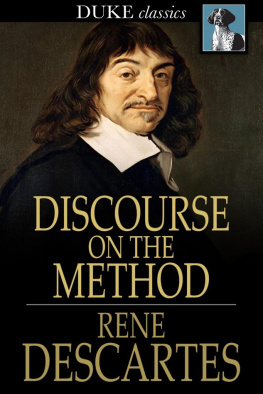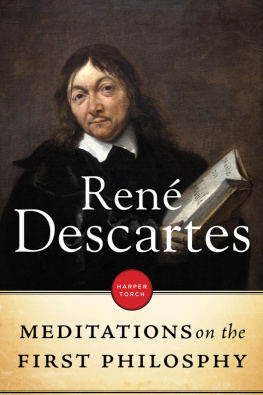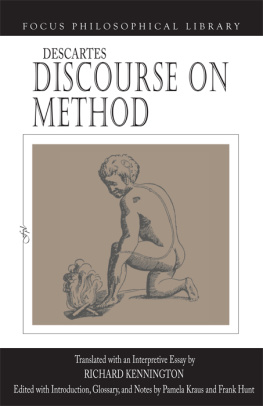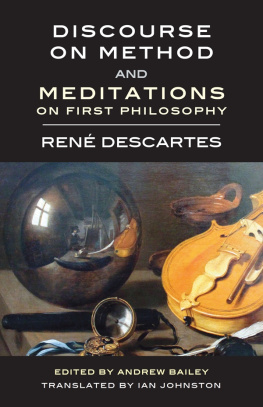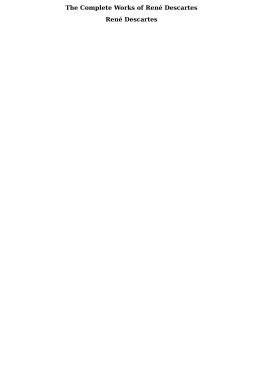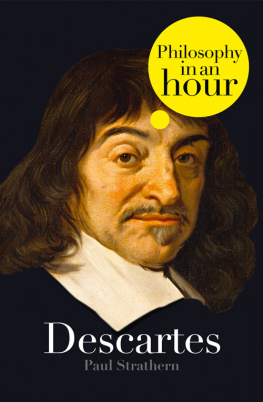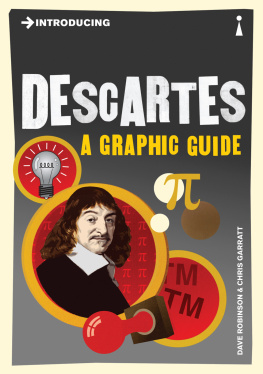René Descartes - Discourse on the Method
Here you can read online René Descartes - Discourse on the Method full text of the book (entire story) in english for free. Download pdf and epub, get meaning, cover and reviews about this ebook. year: 2012, publisher: Duke Classics, genre: Science. Description of the work, (preface) as well as reviews are available. Best literature library LitArk.com created for fans of good reading and offers a wide selection of genres:
Romance novel
Science fiction
Adventure
Detective
Science
History
Home and family
Prose
Art
Politics
Computer
Non-fiction
Religion
Business
Children
Humor
Choose a favorite category and find really read worthwhile books. Enjoy immersion in the world of imagination, feel the emotions of the characters or learn something new for yourself, make an fascinating discovery.
- Book:Discourse on the Method
- Author:
- Publisher:Duke Classics
- Genre:
- Year:2012
- Rating:3 / 5
- Favourites:Add to favourites
- Your mark:
- 60
- 1
- 2
- 3
- 4
- 5
Discourse on the Method: summary, description and annotation
We offer to read an annotation, description, summary or preface (depends on what the author of the book "Discourse on the Method" wrote himself). If you haven't found the necessary information about the book — write in the comments, we will try to find it.
Discourse on the Method — read online for free the complete book (whole text) full work
Below is the text of the book, divided by pages. System saving the place of the last page read, allows you to conveniently read the book "Discourse on the Method" online for free, without having to search again every time where you left off. Put a bookmark, and you can go to the page where you finished reading at any time.
Font size:
Interval:
Bookmark:

Of Rightly Conducting One's Reason and of Seeking Truth in the Sciences
First published in 1637
ISBN 978-1-62012-463-5
Duke Classics
2012 Duke Classics and its licensors. All rights reserved.
While every effort has been used to ensure the accuracy and reliability of the information contained in this edition, Duke Classics does not assume liability or responsibility for any errors or omissions in this book. Duke Classics does not accept responsibility for loss suffered as a result of reliance upon the accuracy or currency of information contained in this book.
If this Discourse appear too long to be read at once, it may be dividedinto six Parts: and, in the first, will be found variousconsiderations touching the Sciences; in the second, the principalrules of the Method which the Author has discovered, in the third,certain of the rules of Morals which he has deduced from this Method;in the fourth, the reasonings by which he establishes the existence ofGod and of the Human Soul, which are the foundations of his Metaphysic;in the fifth, the order of the Physical questions which he hasinvestigated, and, in particular, the explication of the motion of theheart and of some other difficulties pertaining to Medicine, as alsothe difference between the soul of man and that of the brutes; and, inthe last, what the Author believes to be required in order to greateradvancement in the investigation of Nature than has yet been made, withthe reasons that have induced him to write.
Good sense is, of all things among men, the most equally distributed;for every one thinks himself so abundantly provided with it, that thoseeven who are the most difficult to satisfy in everything else, do notusually desire a larger measure of this quality than they alreadypossess. And in this it is not likely that all are mistaken theconviction is rather to be held as testifying that the power of judgingaright and of distinguishing truth from error, which is properly whatis called good sense or reason, is by nature equal in all men; andthat the diversity of our opinions, consequently, does not arise fromsome being endowed with a larger share of reason than others, butsolely from this, that we conduct our thoughts along different ways,and do not fix our attention on the same objects. For to be possessedof a vigorous mind is not enough; the prime requisite is rightly toapply it. The greatest minds, as they are capable of the highestexcellences, are open likewise to the greatest aberrations; and thosewho travel very slowly may yet make far greater progress, provided theykeep always to the straight road, than those who, while they run,forsake it.
For myself, I have never fancied my mind to be in any respect moreperfect than those of the generality; on the contrary, I have oftenwished that I were equal to some others in promptitude of thought, orin clearness and distinctness of imagination, or in fullness andreadiness of memory. And besides these, I know of no other qualitiesthat contribute to the perfection of the mind; for as to the reason orsense, inasmuch as it is that alone which constitutes us men, anddistinguishes us from the brutes, I am disposed to believe that it isto be found complete in each individual; and on this point to adopt thecommon opinion of philosophers, who say that the difference of greaterand less holds only among the accidents, and not among the forms ornatures of individuals of the same species.
I will not hesitate, however, to avow my belief that it has been mysingular good fortune to have very early in life fallen in withcertain tracks which have conducted me to considerations and maxims, ofwhich I have formed a method that gives me the means, as I think, ofgradually augmenting my knowledge, and of raising it by little andlittle to the highest point which the mediocrity of my talents and thebrief duration of my life will permit me to reach. For I have alreadyreaped from it such fruits that, although I have been accustomed tothink lowly enough of myself, and although when I look with the eye ofa philosopher at the varied courses and pursuits of mankind at large, Ifind scarcely one which does not appear in vain and useless, Inevertheless derive the highest satisfaction from the progress Iconceive myself to have already made in the search after truth, andcannot help entertaining such expectations of the future as to believethat if, among the occupations of men as men, there is any one reallyexcellent and important, it is that which I have chosen.
After all, it is possible I may be mistaken; and it is but a littlecopper and glass, perhaps, that I take for gold and diamonds. I knowhow very liable we are to delusion in what relates to ourselves, andalso how much the judgments of our friends are to be suspected whengiven in our favor. But I shall endeavor in this discourse to describethe paths I have followed, and to delineate my life as in a picture, inorder that each one may also be able to judge of them for himself, andthat in the general opinion entertained of them, as gathered fromcurrent report, I myself may have a new help towards instruction to beadded to those I have been in the habit of employing.
My present design, then, is not to teach the method which each ought tofollow for the right conduct of his reason, but solely to describe theway in which I have endeavored to conduct my own. They who setthemselves to give precepts must of course regard themselves aspossessed of greater skill than those to whom they prescribe; and ifthey err in the slightest particular, they subject themselves tocensure. But as this tract is put forth merely as a history, or, ifyou will, as a tale, in which, amid some examples worthy of imitation,there will be found, perhaps, as many more which it were advisable notto follow, I hope it will prove useful to some without being hurtful toany, and that my openness will find some favor with all.
From my childhood, I have been familiar with letters; and as I wasgiven to believe that by their help a clear and certain knowledge ofall that is useful in life might be acquired, I was ardently desirousof instruction. But as soon as I had finished the entire course ofstudy, at the close of which it is customary to be admitted into theorder of the learned, I completely changed my opinion. For I foundmyself involved in so many doubts and errors, that I was convinced Ihad advanced no farther in all my attempts at learning, than thediscovery at every turn of my own ignorance. And yet I was studying inone of the most celebrated schools in Europe, in which I thought theremust be learned men, if such were anywhere to be found. I had beentaught all that others learned there; and not contented with thesciences actually taught us, I had, in addition, read all the booksthat had fallen into my hands, treating of such branches as areesteemed the most curious and rare. I knew the judgment which othershad formed of me; and I did not find that I was considered inferior tomy fellows, although there were among them some who were already markedout to fill the places of our instructors. And, in fine, our ageappeared to me as flourishing, and as fertile in powerful minds as anypreceding one. I was thus led to take the liberty of judging of allother men by myself, and of concluding that there was no science inexistence that was of such a nature as I had previously been given tobelieve.
Font size:
Interval:
Bookmark:
Similar books «Discourse on the Method»
Look at similar books to Discourse on the Method. We have selected literature similar in name and meaning in the hope of providing readers with more options to find new, interesting, not yet read works.
Discussion, reviews of the book Discourse on the Method and just readers' own opinions. Leave your comments, write what you think about the work, its meaning or the main characters. Specify what exactly you liked and what you didn't like, and why you think so.

